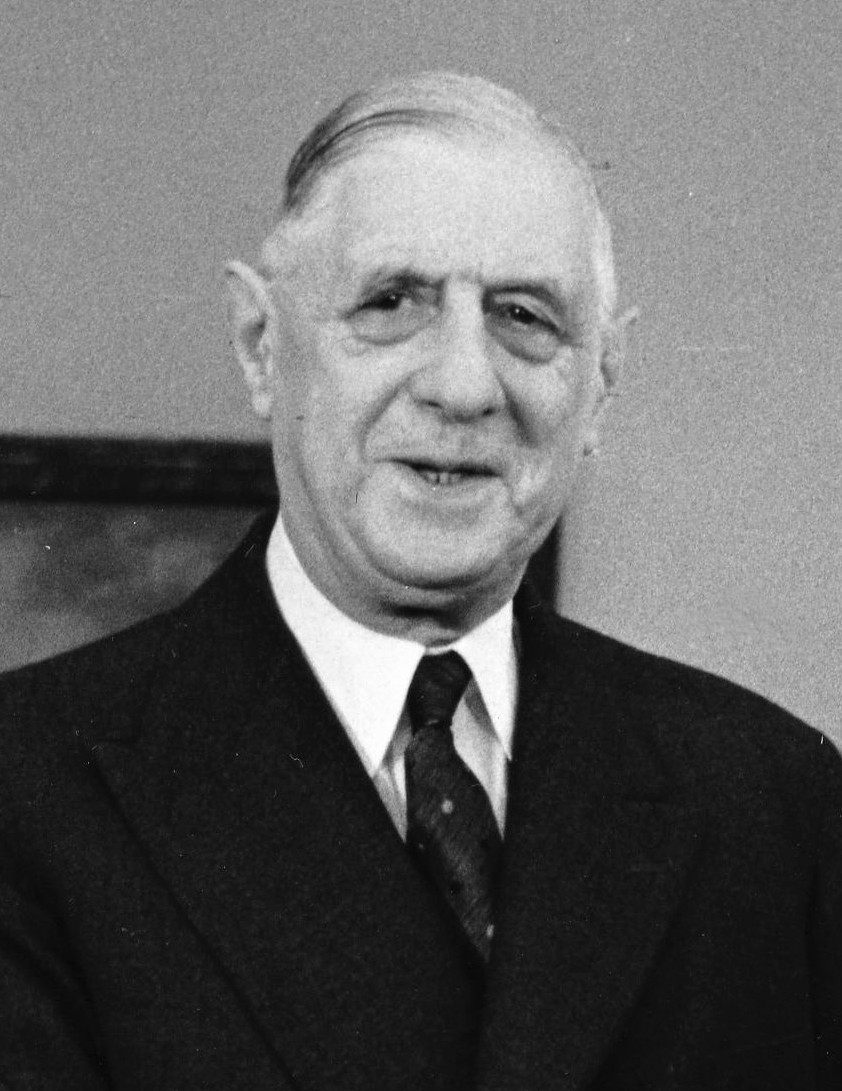Gaullism
Gaullism is a political movement in France that was founded by Charles de Gaulle and that strives for a culturally conservative , economically open-minded, but centralized state. Today a part of the party alliance Les Républicains ( Union pour un mouvement populaire until May 2015 ), to which the former president Nicolas Sarkozy belongs, represents the idea of Gaullism.
When one speaks of Gaullism (historically) among German politicians, one means a foreign policy orientation.
Political ideas
Charles de Gaulle developed the political ideas of Gaullism during the Second World War . An important point at this point was the restoration of the national greatness of Germany- occupied France. From 1959 to 1969 de Gaulle was the first President of the Fifth French Republic , whose form of government he had largely determined.
Gaullism is fundamentally conservative . He strives for a centralized state and values France's international importance. Gaullists are usually moderately right-wing , very patriotic and are ambivalent about European integration .
In Gaullism, two opposites are combined. On the one hand, his supporters advocate social and cultural traditions ; on the other hand, they are open to economic and technical modernization . After the end of the Fourth Republic in 1958, Gaullism became the founding ideology of the Fifth Republic in France .
Parties of Gaullism
Gaullism spawned several parties :
- 1947–1952: Rassemblement du Peuple Français (RPF). After the liberation, de Gaulle established the rassemblement (collection) to implement the political program he presented in the Bayeux speeches . The party remained rather weak in contrast to the Mouvement républicain populaire (MRP), which then dominated the political right.
- 1958–1962: Union pour la Nouvelle République (UNR). It was founded on May 13, 1958 at the height of the Algerian War on de Gaulle's return to government functions. Its members were mainly composed of supporters of an Algerian state under French direction (Algérie Française). When de Gaulle finally presented a policy of self-determination for Algeria, there were differences of opinion with Jacques Soustelle. Important members were Michel Debré and Jacques Chaban-Delmas .
- 1958–1962: Union Démocratique du Travail (UDT). This new movement united the left-wing Gaullists, i. H. those who trusted de Gaulle to negotiate peace in Algeria. Major members were Henri Capitant , Henri Vallon and Léo Hamon .
- 1962–1968: After the Evian Accords and on the occasion of the presidential campaign, these two movements merged under the name UNR-UDT.
- 1968–1971: UNR-UDT became the Union pour la défense de la République (UDR).
- 1971–1976: Union des Démocrates pour la République (UDR)
- 1976-2002: Rassemblement pour la République (RPR)
- since 2008: Debout la République (DLR)
- since 2010: République solidaire (RS)
The neo-Gaullist Rassemblement pour la République (RPR) under Jacques Chirac , which emerged in the 1970s, gained particular importance . After a merger in the course of the presidential election campaign in 2002 for the re-election of Chirac in the Union pour un mouvement populaire (UMP).
Jacques Chirac, Alain Juppé and Georges Pompidou are among the most important Gaullists in France .
"Gaullism" in Germany
In Germany there is actually no Gaullism, but in de Gaulle's time some German politicians were also called "Gaullists". What was meant by this was that these politicians were striving for closer ties to France. The counterpart was the " Atlanticists ", who gave priority to relations with the United States. This distinction applies almost exclusively to the Union parties . Gaullists and Atlanticists agreed that the US was the most important ally for the Federal Republic, it was more about tactical issues.
The distinction also has an economic policy component. Gaullists oriented towards France tended towards an economic policy with greater state intervention ( Rhenish capitalism ). This included a customs policy that shielded the European market. The Atlanteans, on the other hand, sympathized with the free trade ideas that are more common in Great Britain and the USA. Gaullists were mostly Catholics, Atlantic Protestants.
One problem for the German Gaullists was that they had an interest in a strong European community. In France, however, it was de Gaulle who spoke out against it and preferred to speak of a looser “ Europe of the Fatherlands ”.
The best-known Gaullist was Federal Chancellor Konrad Adenauer , who tried to secure the Franco-German friendship treaty of 1963. Mention may also Henry Crown and the Bavarian CSU -Politiker Franz Josef Strauss and Karl Theodor Freiherr von und zu Guttenberg . In the media, Springer-Blätter , Rheinische Merkur , Stuttgarter Nachrichten and Catholic Bildpost were on the Gaullist side.
In contrast, Ludwig Erhard , Gerhard Schröder and Kai-Uwe von Hassel , Der Spiegel , der Stern , Die Zeit , the Sonntagsblatt and Christ und Welt are more likely to be attributed to the Atlantic.
The conflict between the Atlantic and Gaullists was replaced around 1969 by the conflict over the New Ostpolitik . At the same time, de Gaulle resigned as President of France.
Peter Scholl-Latour was an avowed Gaullist (however, he rejected this designation with reference to de Gaulle's death) and viewed the political processes in the Balkans , Africa, the Middle East and East Asia, especially from the perspective of French power politics.
literature
- Tim Geiger: Atlanticists against Gaullists. Foreign policy conflict and intra-party power struggle in the CDU / CSU 1958–1969 . Oldenburg, Munich 2008, ISBN 978-3-486-58586-5 .
- Frédéric Turpin: De Gaulle, les gaullistes et l'Indochine 1940–1956 , Paris 2005, ISBN 2-84654-099-3 .
- Matthias Waechter: The Myth of Gaullism: Hero Cult, Historical Politics and Ideology, 1940–1958 , Wallstein-Verlag, Göttingen 2006, ISBN 3-8353-0023-7 .
Web links
Individual evidence
- ^ "Prospects for change in West German foreign policy". Central Intelligence Agency , September 6, 1966, archived from the original on July 31, 2012 ; Retrieved November 29, 2010 .
- ↑ Peter Hoeres: Review: Tim Geiger: Atlantiker gegen Gaullisten , on: sehepunkte.de. .
- ↑ Phoenix: Unter den Linden, May 7, 2007.

